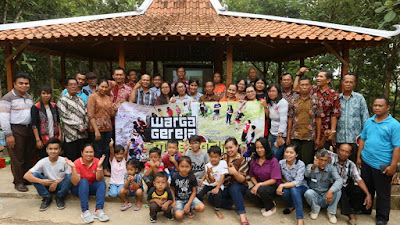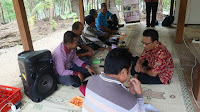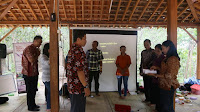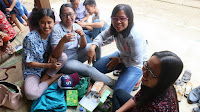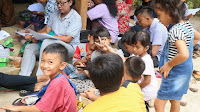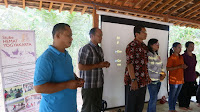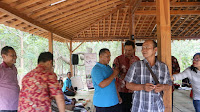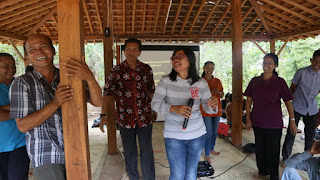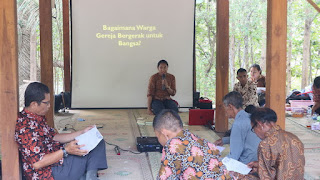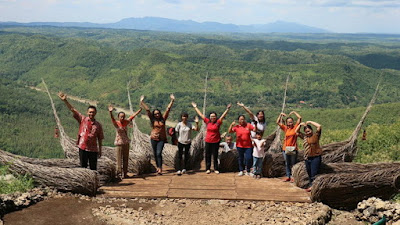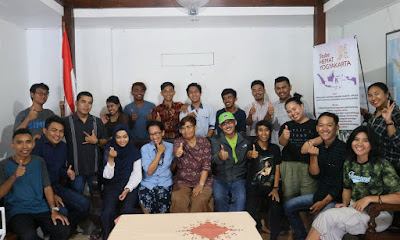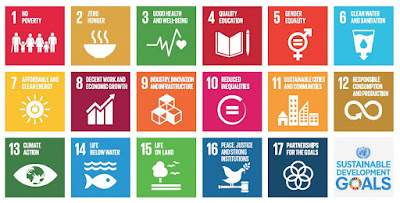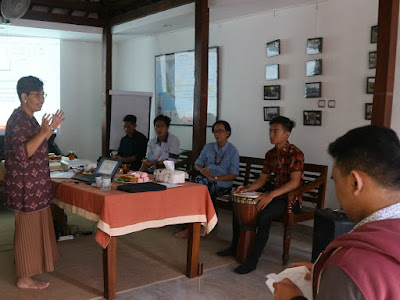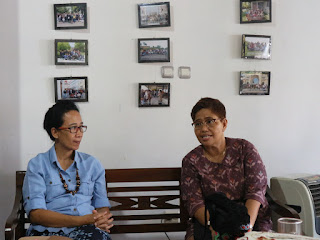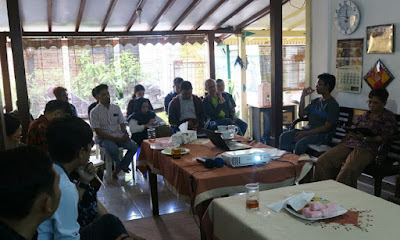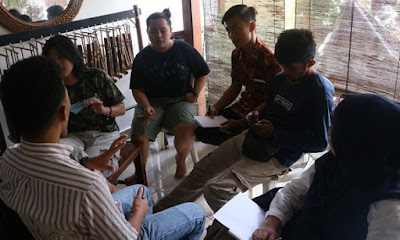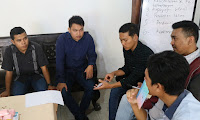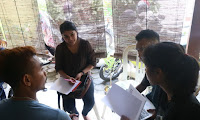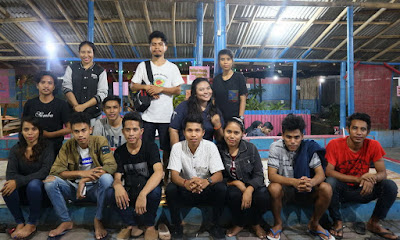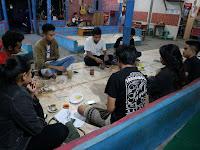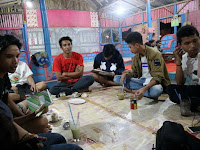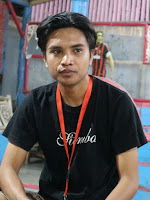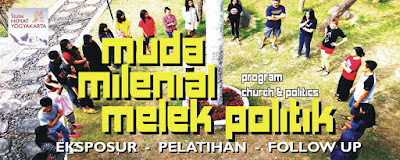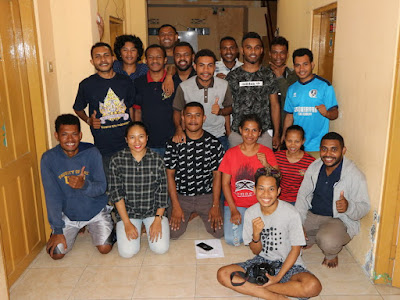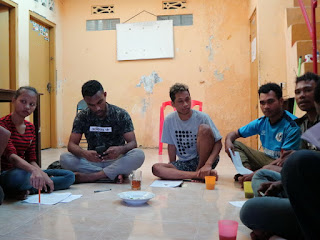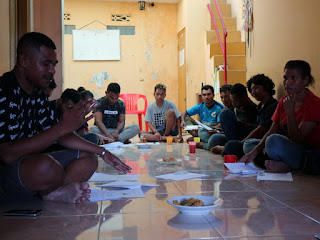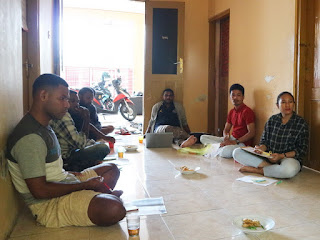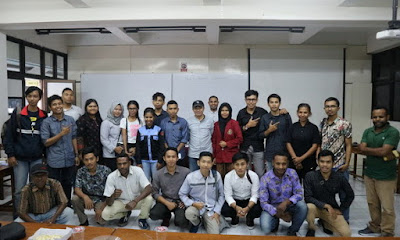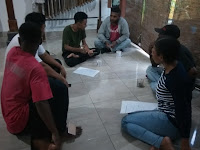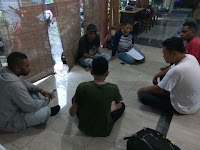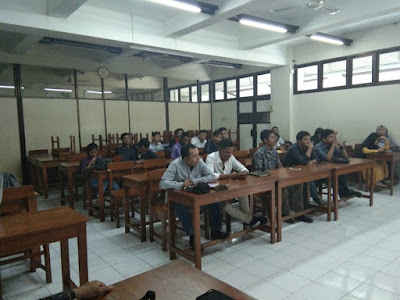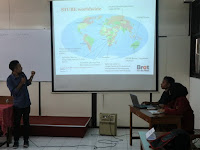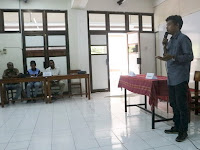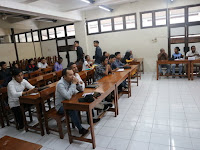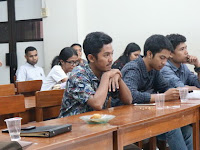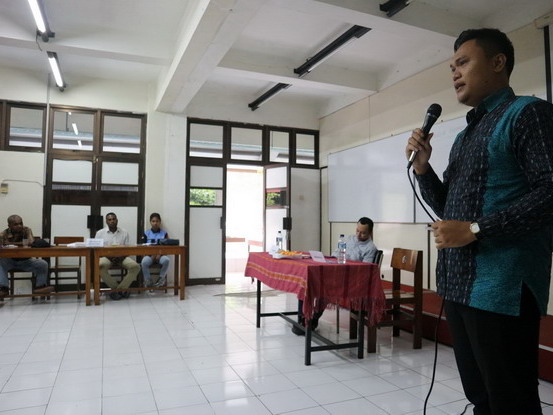Spirit To Be Politics Literate Among Javanese Church Members of Panggang
Sunday, 31 March 2019by adminstube
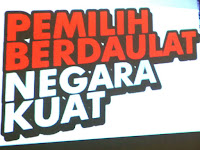 An intimate and warm atmosphere was felt when Stube-HEMAT Yogyakarta team met the assembly and church member of Javanese Christian Church (GKJ) at Watu Payung, Gunungkidul (Saturday, 03/30/2019) in an activity entitled 'Learning Together about Politics' to welcome Indonesia's democratic party namely General Election. The participants consisted of church assemblies, adult citizen commission, youth commission, church elders and comission of testimony and service.
An intimate and warm atmosphere was felt when Stube-HEMAT Yogyakarta team met the assembly and church member of Javanese Christian Church (GKJ) at Watu Payung, Gunungkidul (Saturday, 03/30/2019) in an activity entitled 'Learning Together about Politics' to welcome Indonesia's democratic party namely General Election. The participants consisted of church assemblies, adult citizen commission, youth commission, church elders and comission of testimony and service.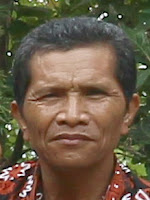 In his remarks, Prambudi Yakobus S, S.Pd, the chairman of the church assembly, expressed his gratitude that the collaboration network between the church and Stube-HEMAT Yogyakarta continues to exist until now and becomes valuable modal for church to grow in the future. Next, Elisabeth Uru Ndaya, S.Pd introduced Stube-HEMAT as a mentoring institution for Christian students in Yogyakarta that equips them as blessing for churches based on their expertise. The church member building program is a form of sharing the blessing of knowledge for many people.
In his remarks, Prambudi Yakobus S, S.Pd, the chairman of the church assembly, expressed his gratitude that the collaboration network between the church and Stube-HEMAT Yogyakarta continues to exist until now and becomes valuable modal for church to grow in the future. Next, Elisabeth Uru Ndaya, S.Pd introduced Stube-HEMAT as a mentoring institution for Christian students in Yogyakarta that equips them as blessing for churches based on their expertise. The church member building program is a form of sharing the blessing of knowledge for many people.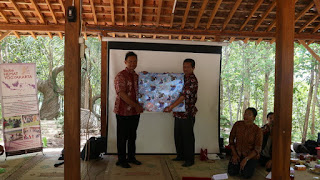 Furthermore, Trustha Rembaka, S.Th., revealed the history of church interaction with political power, starting from the time of Jesus and His disciples who were outside political power and even considered as rebels. In its development, the Christ belivers increased and they had their owned way of living such as living well in honesty and emphaty, and playing many roles in society. But the Roman authorities regarded this as a threat and began to hinder and persecute Christians. Nevertheless Christianity continued to develop, even at the end Christianity was adopted as the state religion. When Christianity began to mix with power, it began to lose its critical power gradually, to ignore humanity, poverty and injustice, because it had been already in comfort zone. The church reformation in 1517 became the peak of disgust for manipulative attitude of the church and leaders, then the reformation brought church back in voicing prophetic voices by struggling for humanity, alleviating poverty and fighting injustice.
Furthermore, Trustha Rembaka, S.Th., revealed the history of church interaction with political power, starting from the time of Jesus and His disciples who were outside political power and even considered as rebels. In its development, the Christ belivers increased and they had their owned way of living such as living well in honesty and emphaty, and playing many roles in society. But the Roman authorities regarded this as a threat and began to hinder and persecute Christians. Nevertheless Christianity continued to develop, even at the end Christianity was adopted as the state religion. When Christianity began to mix with power, it began to lose its critical power gradually, to ignore humanity, poverty and injustice, because it had been already in comfort zone. The church reformation in 1517 became the peak of disgust for manipulative attitude of the church and leaders, then the reformation brought church back in voicing prophetic voices by struggling for humanity, alleviating poverty and fighting injustice.
An interesting game, called ‘Maju Mandeg’ was presented, where participants playd certain characters. The narrator said some statement statements and participants determined whether moving 'Forward' or 'Mandeg' (keep stopping). When participants felt that they are able to move they will 'go forward' or 'stagnate' when they felt inadequate. Finally, it was revealed that the participants are 'stagnant' because they were poor, low education and not confident. This made participants aware that they could have progress through their limitations if there was favor in political policy. This game aroused the awareness and enthusiasm of participants to participate in the Election by considering leaders who were able to bring favor for society.
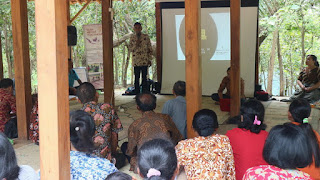 Sarloce Apang, S.T., invited church members to take actions for the nation. They should think not only the church, but also the interests of the nation. She reminded that church members should not be politically blind, unwilling to see, to hear, to speak and to participate in political events. Everyone should be aware that various national policies were the results of political decisions, so apathy and not care to political world would prevent this nation from progress. The last session delivered by Marianus YL Lejap was about 'I and Election' as introduction for participants to know parties competing in election, election organizers and observing presidential candidates, Regional Representative candidates, Legislative candidates for national level, provincial and regency of Gunung Kidul.
Sarloce Apang, S.T., invited church members to take actions for the nation. They should think not only the church, but also the interests of the nation. She reminded that church members should not be politically blind, unwilling to see, to hear, to speak and to participate in political events. Everyone should be aware that various national policies were the results of political decisions, so apathy and not care to political world would prevent this nation from progress. The last session delivered by Marianus YL Lejap was about 'I and Election' as introduction for participants to know parties competing in election, election organizers and observing presidential candidates, Regional Representative candidates, Legislative candidates for national level, provincial and regency of Gunung Kidul."Several years ago our church teenagers and youth expressed positive impression when studying together with Stube-HEMAT teams. So, when there is an opportunity to learn together with Stube-HEMAT, we accept it. In essence, we are thirsty for knowledge and learn new things", said Rev. Subagyo, the pastor of the local church at the end of the event.
A church with strong network, enthusiasm for learning new things, willingness to open its eyes, and politically literate is a growing church and it is a good modal to develop because this activities help church member to have clear understanding and intelligent to determine leaders who are able to bring prosperity to the society. Wish you all have the best choice in the election. (TRU).
Spirit To Achieve The SDGs Target In 2030
Sunday, 31 March 2019by adminstube
A sovereign country is a country having a commitment to bring social welfare for its people, through: alleviating poverty, education for all until Senor High School, good sanitation and health, also reducing the date rate of mother and infant. To achieve it, each country has to bring the same parameter. That’s why on September 2000, Millenium Development Goals (MDGs) were declared on High Millennium Conference by 189 country members of United Nation Organization in New York.
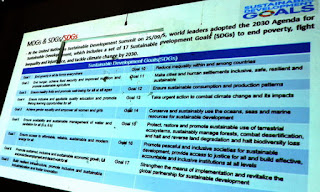 There were 8 main points to achiever until 2015, covering: (1) Eradicate extreme poverty and hunger; (2) Achieve universal primary education; (3) Promote gender equality and empower woman; (4) Reduce child mortality; (5) Improve maternal health; (6) Combat HIV/AIDS, malaria, and other diseases; (7) Ensure environmental sustainability; (8) Global partnership for development. In the process, the MDGs targets in Indonesia and in most countries in the world have not 100% achieved yet. The period of 15 years was not enough to meet the target, so UN country members agreed to continue the program called Sustainable Development Goals on September 2015 in New York. The achievement indicators of SDGs are more detailed in 17 points with an expectation that in 2030 all countries will be free from poverty, all children have qualified educational access with good infrastructure and human resource, and all countries may handle global climate change and problems of life sustainability and peace for all.
There were 8 main points to achiever until 2015, covering: (1) Eradicate extreme poverty and hunger; (2) Achieve universal primary education; (3) Promote gender equality and empower woman; (4) Reduce child mortality; (5) Improve maternal health; (6) Combat HIV/AIDS, malaria, and other diseases; (7) Ensure environmental sustainability; (8) Global partnership for development. In the process, the MDGs targets in Indonesia and in most countries in the world have not 100% achieved yet. The period of 15 years was not enough to meet the target, so UN country members agreed to continue the program called Sustainable Development Goals on September 2015 in New York. The achievement indicators of SDGs are more detailed in 17 points with an expectation that in 2030 all countries will be free from poverty, all children have qualified educational access with good infrastructure and human resource, and all countries may handle global climate change and problems of life sustainability and peace for all.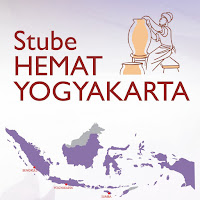 Related with Indonesia responsibility to UN in 2019, Stube-HEMAT Yogyakarta wants to take a part by collecting aspiration and problems faced by young people throughout the islands, as 90% Stube HEMAT activist are coming from outside Jawa Island.
Related with Indonesia responsibility to UN in 2019, Stube-HEMAT Yogyakarta wants to take a part by collecting aspiration and problems faced by young people throughout the islands, as 90% Stube HEMAT activist are coming from outside Jawa Island.The discussion held in Stube-HEMAT Yogyakarta secretary (31/03/2019) attended by 18 students and source person Dr. Murti Lestari, M.Si, Board-in charge of Stube-HEMAT, found that main obstacle is low quality of education bringing to low quality of human resource. Teacher quality, infrastructure, and school distance are main problems in many islands and remote areas throughout Indonesia. Further, un-renewable fuel like coal becomes agenda to reduce, to ensure environmental sustainability and ecosystem to get ideal climate, to reduce gas emission of greenhouse leading to the rise of sea level.
SDG’s and the Role of the Youth
Monday, 25 March 2019by adminstube
The agenda of 2030 for Sustainable Development Goals (SDG’s) was made by United Nations as a worldwide agenda comprising of 17 goals and 169 targets that became guidelines for global actions in the next 15 years. Among them are no poverty; zero hunger; good health and well-being; qualified education; gender equality; clean water and sanitation; affordable and clean energy; decent work and economic growth; industry, innovation, and infrastructure; reduced inequalities; sustainable cities and communities; responsible consumption and production; climate action; sea ecosystem; land ecosystem; peace, justice and strong institutions; and partnership to reach the goals.
SDG’s applies universally to every country, thus all countries without exception has moral responsibility to reach SDG’s goals and targets. Every country must perform review on SDG’s with its achievement and make a document to be reported to global level. Further, knowing that youth has potential capability to influence policies, under cooperation with BAPPENAS, Save The Children Institute Indonesia, and Gusdurian network held a youth consultation on March 23rd to 24th, 2019 at Ibis Hotel Yogyakarta which was attended by 30 youth participants from various organizations, universities, and origins.
 Ratna Yunita, an advisor from Save the Children Institute asked the participants to do a “river of life” by writing and describing issues or forms of injustice that they have encountered since their childhood until now. Afterwards, she explains the purposes and goals of SDG’s for youth and communities and the role of today’s youth. Ratna also explained the parameters of achievement, challenges for SDG’s implementation and emphasized that the government has created a coordination team up to regional level.
Ratna Yunita, an advisor from Save the Children Institute asked the participants to do a “river of life” by writing and describing issues or forms of injustice that they have encountered since their childhood until now. Afterwards, she explains the purposes and goals of SDG’s for youth and communities and the role of today’s youth. Ratna also explained the parameters of achievement, challenges for SDG’s implementation and emphasized that the government has created a coordination team up to regional level.Accompanied by Ryan, one Youth Independent Consultant, participants formed a large group and identified issues at a much deeper scale for every reviewed- parameter based on the “river of life” before the presentation session. There are 6 parameters which are reviewed this year, covering qualified education; climate action; peace and justice; social inequality; partnership to achieve the goals; and gender equality. Participants also created parameters for SDG’s accountabilities and funding, discussed a set priority and the capital, and wrote a recommendation for each parameter at a major issue to be forwarded to BAPPENAS (National Development Planning Institution). On the last session, the participants were asked to discuss and choose one male and one female youth as the recommended representative to BAPPENAS-Jakarta in order to deliver the aspirations of Yogyakarta’s youth.
At the end of the two-days event, Ferdi from Gusdurian network and Sarloce Apang from Stube-HEMAT Yogyakarta was chosen to represent Yogyakarta’s youth delivering ideas and inputs to Indonesian Ministry of National Development Planning at Jakarta around April 2019. (ELZ).
Understanding Politics with Millennial’s View Follow-up activity of PMKRI & Mercu Buana groups
Monday, 25 March 2019by adminstube
 To have political awareness of millennial group, campaign about it should be done continuously. This moment is used by afollow-up group called “ProductiveMilenial” belongs to Rusli, Riki, Marina, and Grace to campaign the importance of politics literacy among milenials. Having knowledge and information from Church and Politics training they followed before, they shared such topic with other student community. Placed at Nemo cafeNologaten (23/03/2019), it was started at 8.45 p.mwith 10 students coming from eastern Indonesia/NTTattended and actively participated on this small discussion.
To have political awareness of millennial group, campaign about it should be done continuously. This moment is used by afollow-up group called “ProductiveMilenial” belongs to Rusli, Riki, Marina, and Grace to campaign the importance of politics literacy among milenials. Having knowledge and information from Church and Politics training they followed before, they shared such topic with other student community. Placed at Nemo cafeNologaten (23/03/2019), it was started at 8.45 p.mwith 10 students coming from eastern Indonesia/NTTattended and actively participated on this small discussion. Mariano Lejap, a team member ofStube-HEMAT Yogyakarta having role as group assistant, explained about the background of the discussion and introduced the service of Stube-HEMAT, a student service that gives empowerment to students through training programs. Many themes are talked over in Stube HEMAT to enlarge knowledge and to enrich students with many experiences.
Mariano Lejap, a team member ofStube-HEMAT Yogyakarta having role as group assistant, explained about the background of the discussion and introduced the service of Stube-HEMAT, a student service that gives empowerment to students through training programs. Many themes are talked over in Stube HEMAT to enlarge knowledge and to enrich students with many experiences.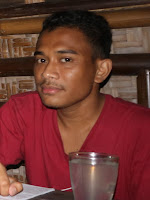 The discussion had 2 main topic, that is, millenial and political participation; and the relationship between church and local areas political situation. Marina, a communication student of MercubuanaUniversity in Yogyakarta led the discussion and all participants were actively shared their experiences in local areas public space and what they viewed on church and politics. Riki started with the understanding of millenial and their political participation nowadays. Was it still relevant with what Soekarno thought? “Now Millenial tends to have instant process in everything, they are more familiar with online application like kitabisa.comwhen they want to involve in public space to collect social fund for natural disaster victims or school renovation. They have left old pattern with complicated procedures”, Mariano told.
The discussion had 2 main topic, that is, millenial and political participation; and the relationship between church and local areas political situation. Marina, a communication student of MercubuanaUniversity in Yogyakarta led the discussion and all participants were actively shared their experiences in local areas public space and what they viewed on church and politics. Riki started with the understanding of millenial and their political participation nowadays. Was it still relevant with what Soekarno thought? “Now Millenial tends to have instant process in everything, they are more familiar with online application like kitabisa.comwhen they want to involve in public space to collect social fund for natural disaster victims or school renovation. They have left old pattern with complicated procedures”, Mariano told. In church and politics session, Rusli, an agriculture student of Sarjanawiyata University, as the discussion angler, asked the forum with a question. Will churches be involved in such issue of government policy that is rejected by the people because it doesn’t stand with them? Will churches be involved in politics?
In church and politics session, Rusli, an agriculture student of Sarjanawiyata University, as the discussion angler, asked the forum with a question. Will churches be involved in such issue of government policy that is rejected by the people because it doesn’t stand with them? Will churches be involved in politics? Grace, one participant from Atambua, NTT shared that pastors in her region had ever preached containing a persuasion that church members should not vote candidates who are not active in church activities. While she thought that the assessment of one candidate cannot rely on such issue but the track record of the candidate achievement for people and society. Religious leaders should not be involved in political practice. Otherwise, Yodi, a student of Management in Sanata Dharma University thought that church should be involved in politics based on the example of Pope in Rome who leads church and does governance administration of Vatican. He told further, “If a church wants to involve in politics, it is better that church members do it not the institution. Next, as young generation, it’s better for young millennial to take a part in church activities to decide church policies”.
Grace, one participant from Atambua, NTT shared that pastors in her region had ever preached containing a persuasion that church members should not vote candidates who are not active in church activities. While she thought that the assessment of one candidate cannot rely on such issue but the track record of the candidate achievement for people and society. Religious leaders should not be involved in political practice. Otherwise, Yodi, a student of Management in Sanata Dharma University thought that church should be involved in politics based on the example of Pope in Rome who leads church and does governance administration of Vatican. He told further, “If a church wants to involve in politics, it is better that church members do it not the institution. Next, as young generation, it’s better for young millennial to take a part in church activities to decide church policies”. As a closing session, all participants agree that millennial generation should care of politics and they may participate based on potency that millennial generally has that is identical with technology and information. [ML]
As a closing session, all participants agree that millennial generation should care of politics and they may participate based on potency that millennial generally has that is identical with technology and information. [ML]
Being Politically Literate and Actively Participate in Church Sumba Student Discussion about Church and Politics
Friday, 15 March 2019by adminstube
 The follow- up of Stube-HEMAT Yogyakarta training on Church and Politics with a theme Young, Millennial and Politically Literate held last February 2019, awakened participants’ heart to share their experiences. The 'follow-up' group from Sumba took initiative to invite fifteen students to have a small discussion about political situation and church's role in politics in Sumba, at Kebun Laras café, Balirejo (03/14/2019).
The follow- up of Stube-HEMAT Yogyakarta training on Church and Politics with a theme Young, Millennial and Politically Literate held last February 2019, awakened participants’ heart to share their experiences. The 'follow-up' group from Sumba took initiative to invite fifteen students to have a small discussion about political situation and church's role in politics in Sumba, at Kebun Laras café, Balirejo (03/14/2019).
Daniel Hamba Banju, a student of Village and Community Development Institute (STPMD), as the discussion lighter started the discussion by inviting participants to think about their understanding what politics was. Some said that politics was dirty, some said that politics was a way to attract people to follow what they want to achieve. Anton, an Agricultural student of Sarjanawiyata University, said that indeed politics was dirty, however, if all people thought it was dirty, who would change politics to be clean. So, young people should not be politically blind. Sarloce Apang, a team member of Stube HEMAT, who was also there to accompany, explained the difference between practical politics and theoretical politics.
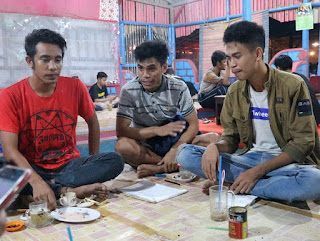 After giving understanding about politics, the group then discussed the extent of Sumba churches to contribute in politics. Tania Taka, a student of Gadjah Mada University, shared her experience that year by year churches in Sumba continuously gave understanding about good politics and remained neutral. She also explained that her father was a pastor and ever elected to be a member of house of representative in East Sumba, and many of his programs were successfully carried out.
After giving understanding about politics, the group then discussed the extent of Sumba churches to contribute in politics. Tania Taka, a student of Gadjah Mada University, shared her experience that year by year churches in Sumba continuously gave understanding about good politics and remained neutral. She also explained that her father was a pastor and ever elected to be a member of house of representative in East Sumba, and many of his programs were successfully carried out.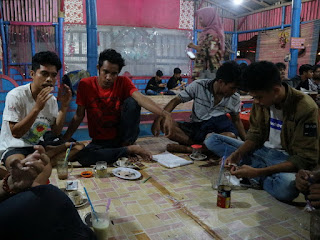 However, there were some participants who disagree if a pastor plunged into politics. Alan Mehakati, a Forestry student of Gadjah Mada University, said that pastor was actually a trusted person in community, if he involved in politics, it would affect the harmony of the congregation that he served. From the discussion, Tania Taka also explained that there was regulation in Sumba synod that pastors who involved in politics, were required to resign from their position in the congregation and were not allowed to preach.
However, there were some participants who disagree if a pastor plunged into politics. Alan Mehakati, a Forestry student of Gadjah Mada University, said that pastor was actually a trusted person in community, if he involved in politics, it would affect the harmony of the congregation that he served. From the discussion, Tania Taka also explained that there was regulation in Sumba synod that pastors who involved in politics, were required to resign from their position in the congregation and were not allowed to preach.Regarding young people’s role in church, the participants assumed that young people were still rarely involved in church service. They also revealed the situation of church in Sumba that used members’ offerings to start business, but brought no profit. Such situation was so apprehensive, because offerings should not be used besides church service, because they were from the congregation and were used to do service for the Lord.
Based on the discussion, it was concluded that young people should not be apathetic to political situation, especially in welcoming democratic party. They are expected to know each candidate who will be voted, to avoid miscasting. They also argued about a need for a change in church life, it is important for young people to take part in it, at least be active in church youth commission or be a church assembly to be directly involved in decision making at the church.
Let us participate and be involved in development, whatever your community is. (ELZ).
Being Politically Literate Based On Information Literacy
Wednesday, 13 March 2019by adminstube
Media becomes very important in the globalization era, especially for young milenials who are politically literate. Because, media is very helpful and simplify people to access information quickly. But, there is something to be aware while accessing media, because there are often found false news or often called ‘hoax’. Along with democracy party or general election this year, all stakeholders needed to anticipate false news (dis-information) and news that is not complete (mis-information) that divisive, confusing or even build hatred.
A follow-up group of students called Sumatera and Purworejo movement (GSP), located in post-graduate hall at STAK Marturia Yogyakarta (12/03/2019), held a discussion which delivered four topics related with political education based on information literacy. Information literacy itself is the ability to know when information is needed, identified, and evaluated effectively. Furthermore, the information is used to understand issue or even problem at hand.
 Twenty two students of STAK Marturia attended the discussion. Four speakers, namely Christian Apri Wijaya (Vice secretary of DPD GAMKI DIY) delivered a topic on ‘Understanding Politics’; Sari Dwi Kristianto (STAK Marturia Yogyakarta Theology student) with a topic on ‘Church and Politics’; Erik Sihombing (Cadre Education Department of GMKI Yogyakarta) with a topic on ‘Election Socialization’; and Astiwijaya Setiandari Salmon (STAK Marturia Christian Education Student) with a topic on ‘Anticipating Hoax in Political Year’.
Twenty two students of STAK Marturia attended the discussion. Four speakers, namely Christian Apri Wijaya (Vice secretary of DPD GAMKI DIY) delivered a topic on ‘Understanding Politics’; Sari Dwi Kristianto (STAK Marturia Yogyakarta Theology student) with a topic on ‘Church and Politics’; Erik Sihombing (Cadre Education Department of GMKI Yogyakarta) with a topic on ‘Election Socialization’; and Astiwijaya Setiandari Salmon (STAK Marturia Christian Education Student) with a topic on ‘Anticipating Hoax in Political Year’.Previously, they had attended a training on Church and Politics with a theme "Young, Millennial, and Literate in Politics" carried out by Stube-HEMAT Yogyakarta (15-17/ 02/2019). The discussion went well, the participants enthusiastically participated in every session by involving actively in Question and Answer session.
 The participation of young generation in General Election on April 17, 2019, can be realized by voting for candidates for Indonesian leaders. As the closing statement of the discussion, the GSP group emphasized, ‘One voter greatly determines Indonesia to be more advanced in the future, and be sure to check the truth of the information obtained from media to avoid hoaxes’. Let us enjoy the democary party of Indonesia. (FAT).
The participation of young generation in General Election on April 17, 2019, can be realized by voting for candidates for Indonesian leaders. As the closing statement of the discussion, the GSP group emphasized, ‘One voter greatly determines Indonesia to be more advanced in the future, and be sure to check the truth of the information obtained from media to avoid hoaxes’. Let us enjoy the democary party of Indonesia. (FAT).Going to Church vs Tourism
Monday, 11 March 2019by adminstube
Going to Church versus tourism has become one challenging not only for believers but for the leaders as well. Moreover,for believers and their congregation in a location that is used as a travel destination. Such issue has escalated into a long and perpetual discussion in certain villages at Raja Ampat District. One of which is the District ofKepulauan Sembilan, GKI Effata Wejim’s Congregation, Raja Ampat District, West Papua.
“Every Sunday, the youth lose their enthusiasm to go to the church, even when the church’s bell rang, it is not only sour to their ears but also it is not missed. Youth prefers to accompany tourists about to stay in resorts and requires their service. Manyworship places are empty and there is no spiritual growth because every Sunday everyone is occupied to welcome tourists. Then what will happen to the fate of the congregation, youth and even, the future of the church?” said Viktor, a college student in Yogyakarta which came from Kepulauan Sembilan District, expressing his worries.
Raja Ampat District is a resort with magnificent underwater paradise and is always flocked by either local and international tourists. The beauty of the sea with its archipelago is a very spectacular sight. There are stretching Karst formation and star-shaped lagoons. What a beautiful heavenlike-view.
Church andpoliticaldiscussions thatwere held by several college students (9/3/2019) took a reflectionof one readingentitled “When Thorn Bushes Became Kings” which was taken from the book of Judges, chapter 9:8-15. The discussion was very dynamic because all participants shared their experiences about their local churches. Anis Bame, a college student of Janabadra University from Maybrat, Papua led the discussion fluently. There are many issues occurring inside church life. “Other than the issue of the youth losing interest to go to church, the issues that also often occurs are pastors and priests jumping into practical politics, resulting in a conflict of interests. It became a fierce debate when a priest or pastor stays to serve his congregation while at the same time taking office as a legislative member. This has discomforted members of the congregation”, said Giovani, Chairman of Raja Ampat College StudentAssociation. “Until now there is no clarity inIndonesian Christian Church (GKI) of Papua, whethera priest or pastor can take office legislatively and still serve the congregation or they need to chooseone or another”, asks him. Sarloce, Stube-HEMAT working team and Kifli Senen, a college student from Halmahera informed that in Churches in Halmahera (GMIH) are already rules regulating that a priest who nominates himself as a legislative member must put down his priesthood. “All of us has the capability to work together to create harmony inside church and politics by separating church and political institution, but in practice, churches still need to convey God’s voice about injustice and inequality that connects with the political realm”, said Sarloce.
The case of going to church versustourism, actuallyit is highly connected with the lack of jobs, triggering youthgoing to work onSundays rather than going to church. It could also because priests and pastors don’t preach about welfare, poverty, socio-cultural issues, and economic issues, because they have entered the governmental system.
It becomes our struggle to fight establishment thatnever hear about people’s struggle, injustice, andinequality. (SAP)
Young People Should Be Critical To Vote
Monday, 4 March 2019by adminstube
Follow-up activities of “Young, Millennial, Political Literacy” Training held by Stube-HEMAT Yogyakarta, intriguing participants to share what they had received from the training individually or in a groups. Some participants who called themselves the PAPEDA (Papua Full of Peace) group consisting of Hanis, Ram, Yansen, Yubelina, Roni, and Frengki conducted a follow-up at the University of Janabadra on Saturday, March 2, 2019.
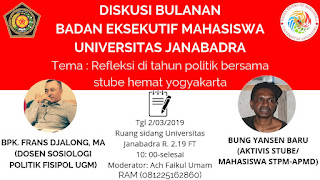 Ram Hara, a Janabadra student from Maybrat, West Papua who is also as the Social Minister of the student Executive Board of Janabadra University, said that this activity was a collaboration between the Ministry of Social Affairs of Janabadra University and the PAPEDA follow-up group.
Ram Hara, a Janabadra student from Maybrat, West Papua who is also as the Social Minister of the student Executive Board of Janabadra University, said that this activity was a collaboration between the Ministry of Social Affairs of Janabadra University and the PAPEDA follow-up group.Expectations of this activity is to share positive understanding and knowledge with other students about the politics gained during the Stube-HEMAT training. The content of the event became more complete with a discussion about reflection on Indonesian politics presented by Frans A. Djalong, M.A., a lecturer from the Department of Sociology at Faculty of Social and Political Sciences, Gajah Mada University.
Located in the room 1.21 of the Faculty of Engineering, University of Janabadra, the event started at 10:00-13.15 Western Indonesian Time. Twenty-two students from various campus such as UGM, Janabadra, and APMD attended the session. Mariano Lejap, the representative of Stube-HEMAT Yogyakarta started the event with an introduction of the institution, followed by sharing experiences from the PAPEDA group represented by Yube, Roni and Yansen.
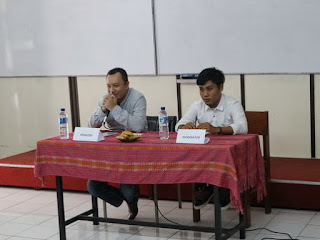 In his presentation, Frans Djalong reflected on the situation of the country's politics, starting from the beginning of Soekarno and other national figures in utilizing the Geopolitical situation and using it for Indonesian independence. The book entitled 'Di Bawah Bendera Revolusi' is one reference for students to read more about history. Furthermore, one of the points about political theory according to him is that there is no theory and practice, theory is the practice itself.
In his presentation, Frans Djalong reflected on the situation of the country's politics, starting from the beginning of Soekarno and other national figures in utilizing the Geopolitical situation and using it for Indonesian independence. The book entitled 'Di Bawah Bendera Revolusi' is one reference for students to read more about history. Furthermore, one of the points about political theory according to him is that there is no theory and practice, theory is the practice itself.Does a farmer doing gardening have no theory? Actually, a theory is a set of thoughts that make a person acting regularly and systematically from time to time. The task of students is to check the theory behind a practice or action. So that students are required to be more critical in making political choices. In the current political situation Frans Djalong advised, "As students, we need to be critical, not deify Jokowi or Prabowo as personal, but what is behind that? Who is behind Jokowi? Who is behind Prabowo? What concepts do they offer to build Indonesia from Aceh to Papua?”
At the end of the session, Robinson, one of the Stube HEMAT Yogyakarta work teams invited all student participants, especially students coming from out of Java Island to check their names in ”Lindungihakpilihmu.com” and reminded participants not to abstain from the upcoming democratic party, April 17, 2019 by taking A5 Forms or information about moving voters and welcome them to the democratic party. (ML).
I Hear, See and Do A Sharing about Church and Politics by Aru student community
Saturday, 2 March 2019by adminmarno
‘I hear then I forget, I see then I remember, I do then I understand'. This is an old saying from Confucius. It becomes a strong motivation for someone that learning is not enough just for listening but it needs to observe and practice whathas been learned. When a person experiences his own learning process, he/she will understand.
 The same thing happened in ‘Church and Politics’ training held by Stube-HEMAT Yogyakarta on February 15-17, 2019 with a theme 'Young, Millennials and PoliticalLiterate', in which the participants gained new enlightenment and understanding of church history and political dynamics, how young Christians should behave in the context of today's politics. They were encouraged not only to be listeners but also to share their experiences with others, either personal or group.
The same thing happened in ‘Church and Politics’ training held by Stube-HEMAT Yogyakarta on February 15-17, 2019 with a theme 'Young, Millennials and PoliticalLiterate', in which the participants gained new enlightenment and understanding of church history and political dynamics, how young Christians should behave in the context of today's politics. They were encouraged not only to be listeners but also to share their experiences with others, either personal or group.
One group of students from Aru islands initiated a 'sharing' with youth of Gereja Sahabat Indonesia (GSI) in Condongcatur on Friday, March 1, 2019. In this session Natasya Derman, who study Indonesian Language and Literature Education in UST, began the discussion by delivering her experiences when participating in Stube-HEMAT Yogyakarta through its training, discussion and local exposure. Next, she invited participants to write their perceptions about politics. They wrote various opinions, such as power, corruption, ignorance and dirty. It is the same as what she has experienced before who did not know even apathy towards politics, but in the training she found enlightenment, it turned out that the essence of politics was not bad, dirty and lust of power, but actions to bring prosperity. The negative 'image' of politics is caused by individuals who have political power to commit corruption, collusion and abuse of authority. Therefore, we are called to improve the situation, one of which is participating in general elections to determine the next leader of this nation.
Related with church and political world, Lenora Nada, an Informatics student of Immanuel Christian University shared a topic on church interacted with political world. The early church was separated from political power, even considered a threat for the government. But even though the early church was hampered and persecuted, the church members played many roles among the community at that time because they were considered good people, had strong spirituality and were trustworthy. Inevitably the authorities at that time accommodated them to take part in the community. The development of Christianity is growing widespread. The peak was when Christianity became a state religion in the era of Constantine. People converted to be Christiansbecause they wanted to get rights to be Roman citizens. The church and political power merged and tended to abuse of power both church and political leaders. The Church no longer voiced its struggle on injustice, poverty and oppression, but instead perpetuated power. Finally church reformation busted out and then church positioned itself outside of political power, but it brings impact that church members afraid talking about politics.
 Trustha Rembaka, the coordinator of Stube-HEMAT Yogyakarta, who accompanied the group, reminded participants as citizens to take part in general election by giving vote in the election. He also helped participants to check whether their names were registered already as voters or not. At the end of the session, Tasya again revealed that young peopleshould reflect on the values of Christianity and support the government actively to bring socialwelfare. (Natasya Derman).
Trustha Rembaka, the coordinator of Stube-HEMAT Yogyakarta, who accompanied the group, reminded participants as citizens to take part in general election by giving vote in the election. He also helped participants to check whether their names were registered already as voters or not. At the end of the session, Tasya again revealed that young peopleshould reflect on the values of Christianity and support the government actively to bring socialwelfare. (Natasya Derman).
Web Archive
2024 (5) 2023 (38)
2013 (20)
2012 (12)
2011 (2)
2010 (18)
Total: 448

